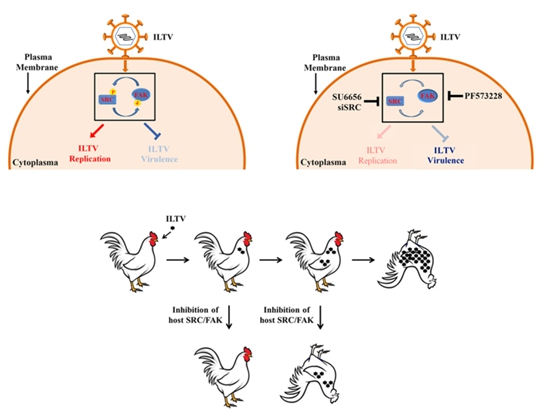分享到
Researchers Identify a Crucial Virulence Determinant of Infectious Laryngotracheitis Virus (ILTV)
The lab of avian respiratory infectious diseases led by Dr. Liu Shengwang at the Harbin Veterinary Research Institute (HVRI) of Chinese Academy of Agricultural Sciences (CAAS) identified the first host modulator of ILTV infection. This finding has been published in the Journal of Virology.
Infectious laryngotracheitis (ILT) is a major respiratory disease of chickens which could cause large economic losses to the poultry industry worldwide annually. Given the side effects of vaccination against ILT, novel strategies for ILT control and therapy are urgently needed. Using genome-wide transcriptome studies in combination with a bioinformatic analysis, Dr. Liu and his colleagues identified proto-oncogene tyrosine-protein kinase SRC (SRC) as an important modulator of ILTV infection. Their further studies revealed that SRC controls the virulence of ILTV through a positive feedback loop with the tyrosine kinase focal adhesion kinase (FAK). These results advance the current understanding of host-ILTV interactions on a molecular level, and provide experimental evidence that is possible to control ILT via the manipulation of host-virus interactions.

Infectious laryngotracheitis (ILT) is a major respiratory disease of chickens which could cause large economic losses to the poultry industry worldwide annually. Given the side effects of vaccination against ILT, novel strategies for ILT control and therapy are urgently needed. Using genome-wide transcriptome studies in combination with a bioinformatic analysis, Dr. Liu and his colleagues identified proto-oncogene tyrosine-protein kinase SRC (SRC) as an important modulator of ILTV infection. Their further studies revealed that SRC controls the virulence of ILTV through a positive feedback loop with the tyrosine kinase focal adhesion kinase (FAK). These results advance the current understanding of host-ILTV interactions on a molecular level, and provide experimental evidence that is possible to control ILT via the manipulation of host-virus interactions.

Latest News
-
 Apr 18, 2024Opening Ceremony of the Training Workshop on Wheat Head Scab Resistance Breeding and Pest Control in Africa Held in CAAS
Apr 18, 2024Opening Ceremony of the Training Workshop on Wheat Head Scab Resistance Breeding and Pest Control in Africa Held in CAAS -
 Apr 03, 2024IPPCAAS Co-organized the Training Workshop on Management and Application of Biopesticides in Nepal
Apr 03, 2024IPPCAAS Co-organized the Training Workshop on Management and Application of Biopesticides in Nepal -
 Mar 28, 2024Delegation from the School of Agriculture and Food Science of University College Dublin, Ireland Visit to IAS, CAAS
Mar 28, 2024Delegation from the School of Agriculture and Food Science of University College Dublin, Ireland Visit to IAS, CAAS -
 Mar 25, 2024Director of World Food Prize Foundation visited GSCAAS
Mar 25, 2024Director of World Food Prize Foundation visited GSCAAS -
 Mar 20, 2024Institute of Crop Sciences (ICS) and Syngenta Group Global Seeds Advance Collaborative Research in the Seed Industry
Mar 20, 2024Institute of Crop Sciences (ICS) and Syngenta Group Global Seeds Advance Collaborative Research in the Seed Industry

